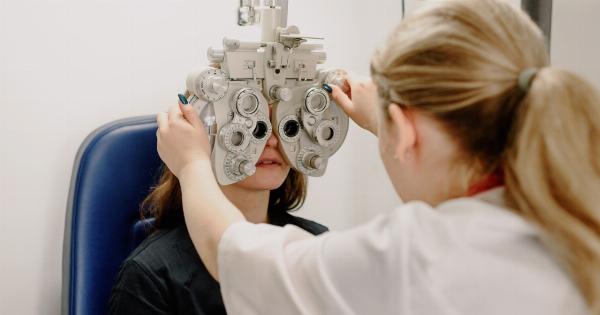Glaucoma is a group of eye conditions that damage the optic nerve, the structure responsible for transmitting visual information from the eye to the brain. It is usually caused by the buildup of pressure in the eye, known as intraocular pressure (IOP).
Glaucoma can gradually impair vision and, if left untreated, may eventually lead to blindness.
Understanding the Early Stages of Glaucoma
Glaucoma typically develops slowly and without noticeable symptoms in its early stages, making it difficult to detect. This is why regular eye exams are crucial for early diagnosis.
In the early stages of glaucoma, peripheral vision is usually affected first, and individuals may not even notice any changes. As the disease progresses, central vision may also be compromised, resulting in significant visual impairment.
Risk Factors for Glaucoma
While glaucoma can affect anyone, certain factors increase the risk of developing the condition:.
- Age: The risk of glaucoma increases significantly after the age of 60.
- Family history: Having a close relative with glaucoma increases the likelihood of developing the disease.
- High eye pressure: Elevated IOP is a significant risk factor for glaucoma.
- Thin corneas: Thin corneas may be more susceptible to damage from high IOP.
- Medical conditions: Conditions like diabetes, high blood pressure, and heart disease increase the risk of glaucoma.
Early Stage Glaucoma Symptoms
In the early stages of glaucoma, symptoms are usually absent or extremely subtle. However, some individuals may experience:.
- Mild headaches
- Blurred vision
- Difficulty adjusting to dark rooms
- Eye strain or fatigue
- Mild eye pain
Importance of Regular Eye Exams
Regular eye exams are vital for early stage glaucoma detection, as symptoms are often not apparent until significant damage has occurred.
During an eye exam, your eye doctor will measure your intraocular pressure, conduct a visual field test, and examine the optic nerve for any signs of damage or abnormalities. Early detection allows for early intervention and better preservation of vision.
Treatment Options for Early Stage Glaucoma
While glaucoma damage cannot be reversed, early intervention can slow down disease progression and preserve remaining vision. Treatment options for early stage glaucoma include:.
- Medicated eye drops to reduce intraocular pressure
- Oral medications to decrease eye pressure
- Laser trabeculoplasty to improve fluid drainage from the eye
- Minimally invasive glaucoma surgery to enhance fluid outflow
Lifestyle Changes to Support Eye Health
Adopting certain lifestyle habits can help protect your sight and manage early stage glaucoma:.
- Follow your eye doctor’s recommended treatment plan
- Avoid smoking, as it increases the risk of optic nerve damage
- Maintain a healthy diet rich in fruits and vegetables
- Engage in regular exercise to improve overall circulation
- Protect your eyes from UV radiation by wearing sunglasses outdoors
- Manage stress levels, as stress can elevate intraocular pressure
Monitoring Progression and Regular Checkups
Once diagnosed with early stage glaucoma, it is essential to schedule regular checkups with your eye doctor. These checkups allow for monitoring the progression of the disease and evaluating the effectiveness of the treatment plan.
Your eye doctor may adjust medication or recommend additional interventions if needed.
Importance of Compliance in Glaucoma Management
Compliance with the recommended treatment plan is crucial for managing early stage glaucoma effectively. Skipping doses of medication or neglecting regular checkups can significantly impact the success of treatment.
Remember, early stage glaucoma is manageable, but only if individuals take an active role in their eye health and follow their eye doctor’s instructions.
Preserving Your Sight, Protecting Against Glaucoma
While early stage glaucoma can be daunting, being proactive about your eye health can significantly improve the prognosis:.
- Schedule routine eye exams to ensure early detection and intervention.
- Monitor IOP regularly and follow your eye doctor’s recommendations.
- Adopt a healthy lifestyle to support overall eye health.
- Protect your eyes from potential injuries and UV radiation.
- Communicate openly with your eye doctor about any concerns or changes in your vision.
Conclusion
Early stage glaucoma can often go unnoticed due to the lack of symptoms. However, with regular eye exams and proper management, individuals can protect their sight and slow down the progression of the disease.
By understanding the risk factors, recognizing the symptoms, and adhering to the treatment plan, early stage glaucoma can be effectively managed, preserving vision and enhancing quality of life.



























